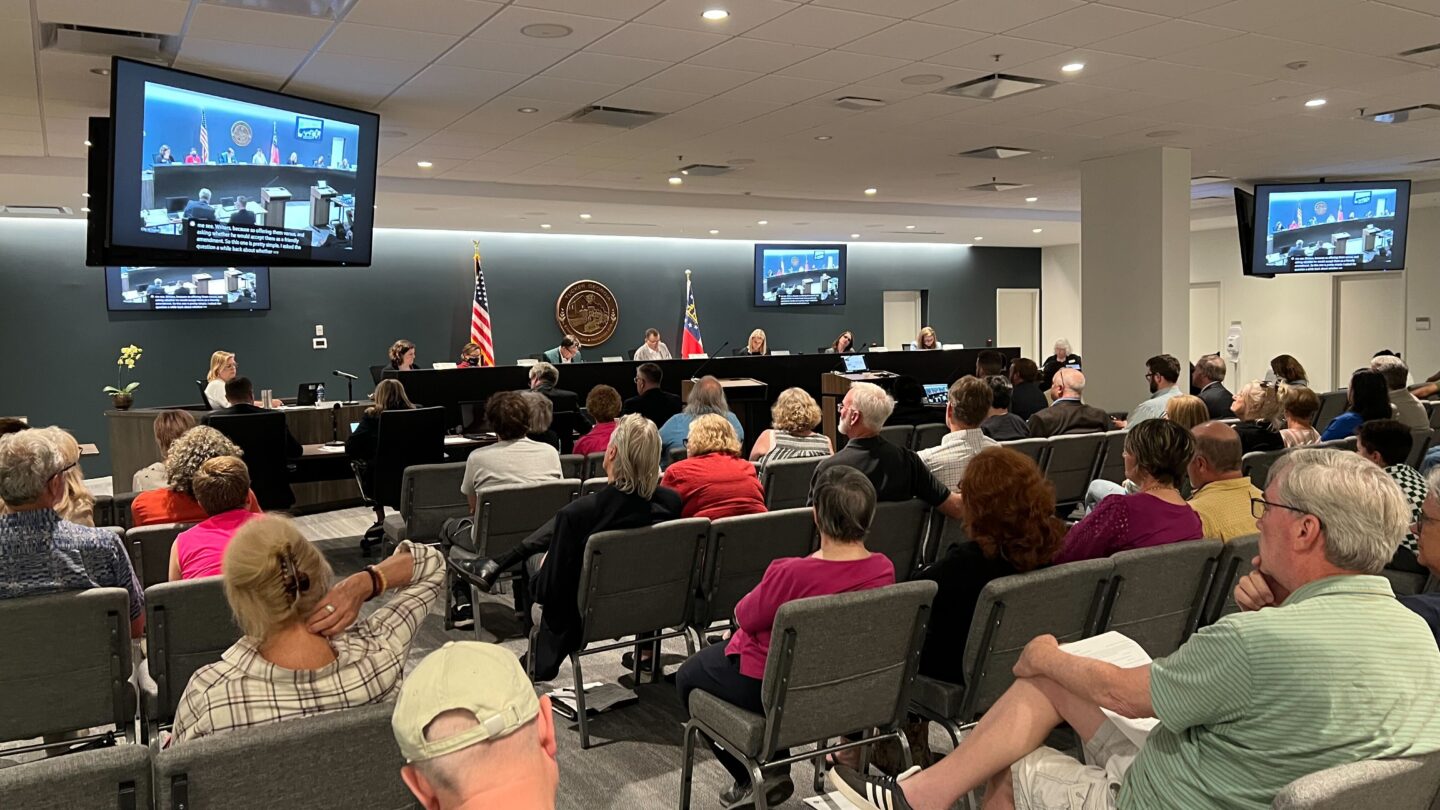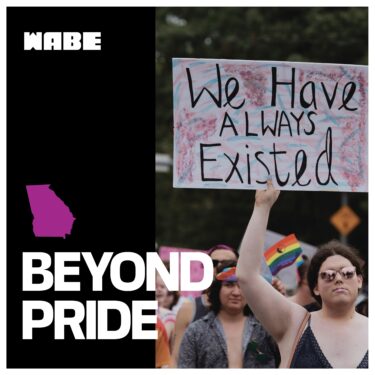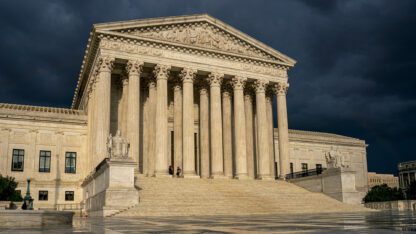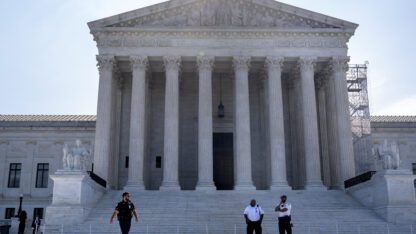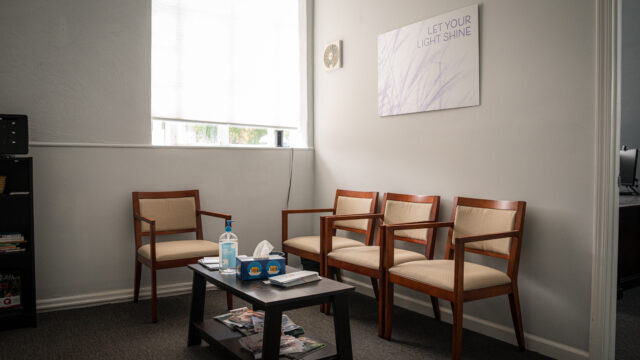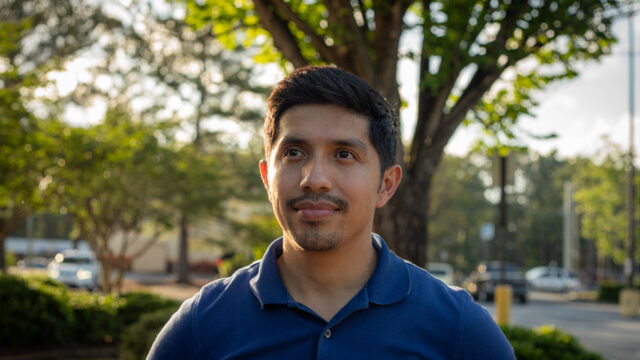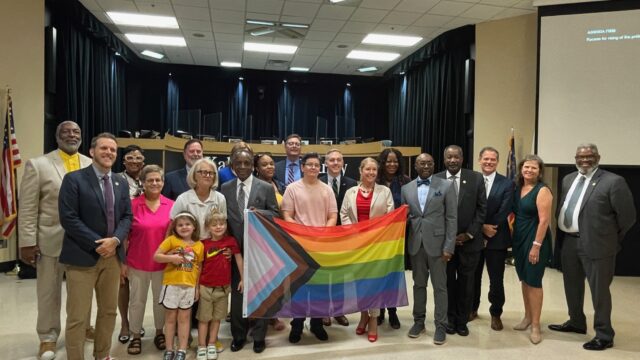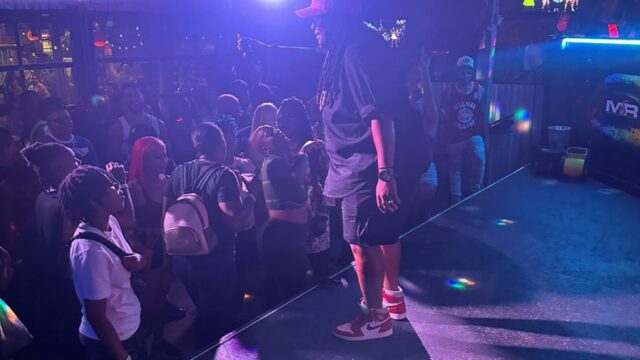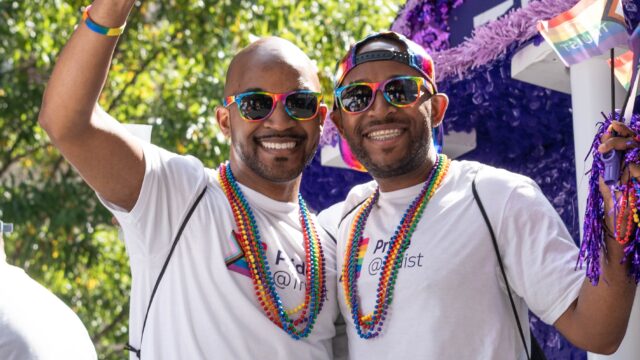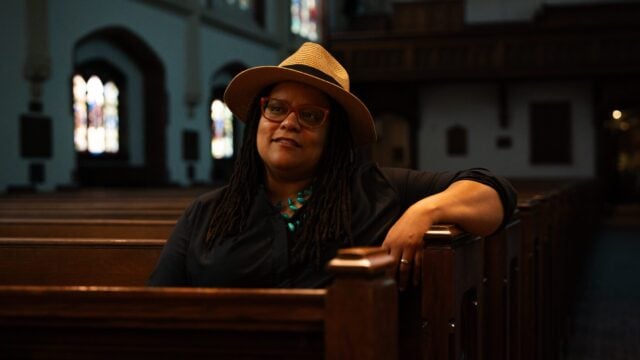The City of Tucker voted to pass a sweeping non-discrimination ordinance at its Monday evening city council meeting, joining a growing number of other Georgia municipalities in protecting residents from discrimination in recent years.
All six councilmembers voted in favor of the ordinance. Mayor Frank Auman wasn’t present to cast his vote — he left his chair and exited the room seconds before, foregoing a proper recess. The council voted without him.
The tense moment came after Auman spent over 30 minutes explaining why he was against the ordinance, pleading with the council to delay the vote. Auman argued that the NDO would force individuals to subvert their own beliefs to avoid punitive measures.
Meeting attendees cheer after the NDO passes. (Jasmine Robinson/WABE)
Auman said that the ordinance prohibits the free practice of religion. However, Tucker’s NDO offers protections for religion and gives special exemptions to religious groups to practice their faith freely.
The NDOs being adopted around metro Atlanta protect individuals against discrimination based on federally protected classes, such as race, color, religion, sex, sexual orientation, gender identity, national origin and disability. The ordinance safeguards people from unjust discrimination in employment, housing and public accommodations.
But unlike other cities, the NDO in Tucker brought significant controversy. The opposition revolved around protections for sexual orientation and gender identity, and how that clashes with some people’s religious beliefs, which are also protected.
Supporters say the NDO is important to ensure equality in Tucker, especially for its LGBTQ residents.
A team of WABE reporters take a deeper look at the issues affecting LGBTQ people in Georgia. Plus, LGBTQ Atlantans in their own words, Pride events calendar, LGBTQ coverage from other NPR stations across the South and more.
Georgia is one of three states without a comprehensive civil rights law. Tucker is the 14th municipality in Georgia to adopt an NDO since 2018.
The push for NDOs in metro Atlanta comes at a time when anti-LGBTQ legislation is on the rise in Georgia. Since 2018, 19 anti-LGBTQ bills have been proposed in the state legislature — seven of which were proposed this year. This year’s SB140, which bans some gender-affirming medical treatments for minors, was the first explicit anti-LGBTQ law that passed and was signed into law since 2004. And the Human Rights Campaign recently declared a state of emergency for LGBTQ people in the U.S.
“I don’t think that this is something that should be controversial,” said Tucker City Councilmember Alexis Weaver ahead of the June 12 vote. “I don’t think that non-discrimination is controversial. I think we want to be thinking about humanity and our fellow citizens and how we treat them in all aspects.”
“We’ve been working on this for four years. And four years ago, we could have passed it and not been in the position that we’re in now. And now I think it’s drawn a lot more scrutiny and more eyes just because of the political climate.”
Damyon Claar-Pressley
Tucker’s original draft ordinance is modeled after the NDOs in Doraville and Chamblee. Led by Councilmember Stephe Koontz, Doraville was the second municipality in Georgia to pass an NDO.
Before 2018, the City of Atlanta was the only municipality with an NDO, although some municipalities had adopted protections against discrimination for city and county employees only. The rest of Georgia was only covered by disjointed state laws and distant federal protections.
“It’s almost comical that we’re the birthplace for the Civil Rights Movement, and there’s still no civil rights in our state,” Koontz said.
Roughly 12% of Georgians are covered by a non-discrimination ordinance, according to the LGBTQ rights organization Georgia Equality. Under a Georgia statute called Home Rule, cities can regulate businesses stricter than what the state requires without action from the General Assembly.
Georgia municipalities with an ordinance prohibiting discrimination in employment, housing and public accomodations:
- Atlanta (2000)
- Athens-Clarke County (2021)
- Augusta-Richmond County (2021)
- Brookhaven (2020)
- Chamblee (2019)
- Clarkston (2019)
- Decatur (2019)
- Doraville (2018)
- Dunwoody (2019)
- East Point (2020)
- Hapeville (2020)
- Savannah (2020)
- Smyrna (2020)
- Statesboro (2020)
- Tucker (2023)
NDOs only apply to businesses that are required to have a business license and are open to the public. It outlines a mediation process for settling discrimination complaints privately. The penalties vary from municipality to municipality, but those found in violation of an NDO can be subject to fines or in some cases the loss of a business license.
“It’s got to be a really egregious [situation] to even cross that bar of being able to file a complaint,” Koontz said.
Koontz gave an example, pointing back to a 2018 incident in Sandy Springs when a gay couple was denied service by a landscaping business. When the business owner realized it was a gay couple, he immediately refused to do the service. The homeowner left the business a bad Yelp review, and the business owner responded with homophobic comments.
If Sandy Springs had an NDO, the customer could file a complaint against the business for its refusal to do a service based on their sexual orientation. But nothing can be done about the homophobic comments, and his speech is protected.
Koontz said that a common misconception is that an NDO violates a person’s freedom of speech. In actuality, all speech is protected, even if it’s discriminatory in nature.
The fight in Tucker
Tucker’s fight for an NDO began in 2019. The city’s first NDO was drafted by the grassroots organization Tucker Open Door, which worked to garner community support and awareness for the legislation.
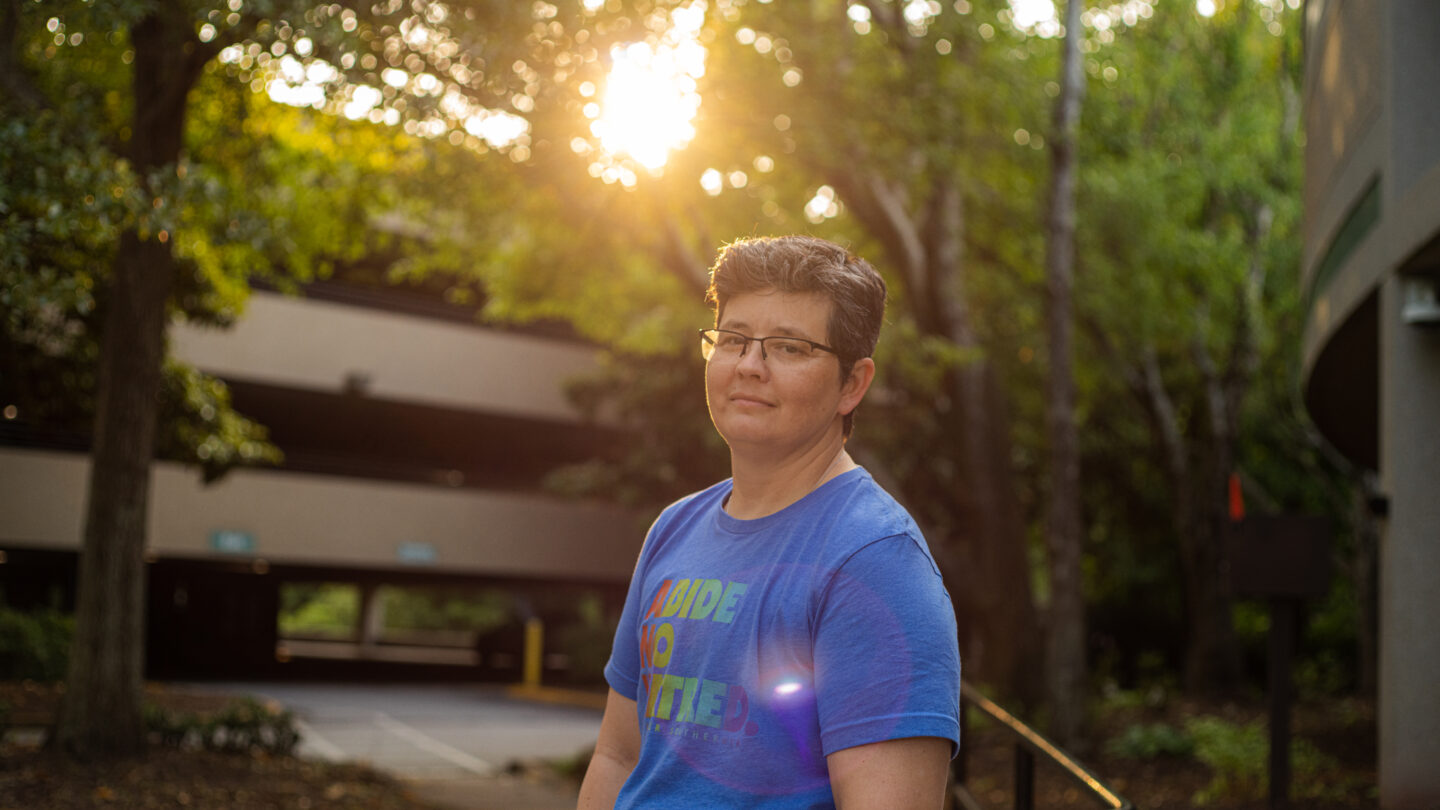
The current ordinance was drafted by a subcommittee appointed by the mayor, and Tucker Open Door worked closely with them on modifying it.
Damyon Claar-Pressley, a co-founder of Tucker Open Door, says that Tucker has a large LGBTQ community that an NDO would protect.
“It’s really about making those people feel welcome and to feel like what we’re putting out there to the broader community is the way that the community feels,” she says. “And it’s validating to our experience here.”
Final passage of the NDO has been an uphill battle for Tucker Open Door over the past four years. Claar-Pressley said that during the first read on May 8 of this year, Mayor Auman made it a divisive issue and attacked it with inflammatory speech.
“The backlash and all of this anti-NDO sentiment that we’re seeing in Tucker, I want to make sure people understand that that’s not actually how the majority of folks in the city feel,” she said. “The vast majority of folks in this city support the NDO and are very supportive.”
A point of contention has been around the perceived government intervention in people’s religious beliefs.
Troy Bush, a pastor at Rehoboth Baptist Church in Tucker, says that the additional regulations imposed by an NDO aren’t necessary to combat discrimination that might be occurring. Rather, he said the ordinance in its current form inflicts “disproportionate harms on significant segments of our community.”
“The proposal goes far beyond confronting unjust discrimination,” Bush said in an emailed statement. “It violates fundamental freedoms, harms women and girls, and undermines the common good.”
Specifically, he said the NDO would require giving men access to women’s private spaces and sports teams, and it will “compel creative professionals … to create custom expression that violates their deeply-held beliefs.”
The final ordinance does not include language about single-sex designated areas, such as public restrooms.
Bush said that laws protecting gender identity are used to “compel medical and mental health professionals to engage in so-called ‘gender affirming’ interventions” and coerce people to use transgender people’s preferred pronouns — two things that might not align with their religious convictions.
But religious beliefs are protected under the NDO. It includes exemptions for church and other faith-based institutions, except for activities that generate taxable income.
Some in Tucker’s religious community do see the value of an NDO. One public commenter at the June 12 meeting, Tom Edmondson of First Presbyterian Church of Atlanta, voiced his support.
“In short, I do not believe it poses a danger to religious institutions or individuals,” he said. “I believe that what we have before us is actually a civic issue regarding the government’s role in guaranteeing the rights and responsibilities of everyone.”
Statewide protections
Georgia Equality is working with the state legislature to get a statewide civil rights law passed. The organization has worked on statewide non-discrimination laws for the better part of a decade.
Georgia Equality’s work has intensified as they’ve seen attempts to pass a state version of the federal Religious Freedom Restoration Act. Graham said in recent years, it has been weaponized and used as an excuse to discriminate against others, specifically among religious lines.
“Here in Georgia, we have long maintained that because we don’t have civil rights protections for any group of people, if you carve out protections for one group — in this instance, people of faith — you automatically create an imbalance within the courts that would weigh the rights of people of faith over the rights of anyone else. And that’s where it goes from protecting beliefs to opening up the doors to discrimination.”
So, there’s renewed urgency to get a statewide civil rights law passed. Civil rights laws have been introduced every year, but this year, one was introduced in the final days of the legislative session for the first time by a bipartisan group of legislators. He still thinks it’ll be a while before final passage of any legislation.
“But in the meantime, local communities can step in and fill in that gap,” Graham says.
In Tucker, he says that this is the first time there’s been serious, organized opposition to an NDO in Georgia. It comes at the same time as a rise in anti-LGBTQ bias, legislation, threats and acts of violence. He called it a “coincidence that cannot be ignored.”
Now more than ever, he said, members of the LGBTQ community need to have these protections in place.
“It is something that local communities can do to push back against some of the bias messaging that we are hearing on a statewide level here in Georgia and elsewhere.”
Note of correction: An earlier version of this story has been changed to reflect the potential religious convictions described by Troy Bush as being that of medical and mental health professionals.
This story is part of the ongoing series Beyond Pride, in which WABE reporters take a deeper look at the issues affecting LGBTQ people in Georgia. Plus, hear LGBTQ Atlantans in their own words, check out a Pride events calendar running through the fall, LGBTQ coverage from other NPR stations across the South and more.
